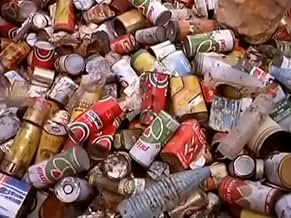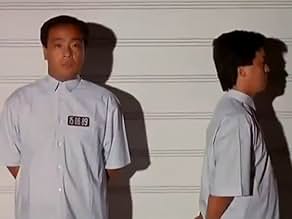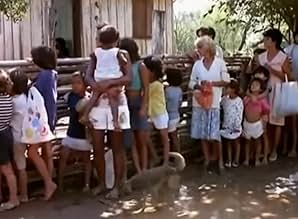AVALIAÇÃO DA IMDb
8,5/10
6,9 mil
SUA AVALIAÇÃO
A saga irônica, comovente e ácida de um tomate estragado.A saga irônica, comovente e ácida de um tomate estragado.A saga irônica, comovente e ácida de um tomate estragado.
- Direção
- Roteiristas
- Artistas
- Prêmios
- 4 vitórias no total
- Direção
- Roteiristas
- Elenco e equipe completos
- Produção, bilheteria e muito mais no IMDbPro
Avaliações em destaque
10jordani
Jorge Furtado needed no more than 13 minutes to prove his theory "there's no God", showed in the beginning of the movie. This movie is as raw as fresh meat and cuts like a knife. No more words to describe. You must see it for yourself. Believe me, after you watch this movie you won't forget it never more.
I'm using my personal VHS copy of this excellent short in my environmental awareness classes for high school, and students are always stroked by its accurate and intelligent issues.It always provides very large and useful discussion about environmental issues.
With a very well humored screenplay and very well balanced use of fiction, documentary and table top animation, this short gives you an overview of what happens in our affluent society with any natural or produced good, with domestic and industrial waste and discussing some very special social issues.
Interesting thing is that this short Ilha days Flores ( Flower Island, in English pronounced Ilya Dass Floresh) it is not outdated, not growing old and unfortunately still shocking when you think of what is happening with all the waste in our society, when people are less important than the profit made.
With a very well humored screenplay and very well balanced use of fiction, documentary and table top animation, this short gives you an overview of what happens in our affluent society with any natural or produced good, with domestic and industrial waste and discussing some very special social issues.
Interesting thing is that this short Ilha days Flores ( Flower Island, in English pronounced Ilya Dass Floresh) it is not outdated, not growing old and unfortunately still shocking when you think of what is happening with all the waste in our society, when people are less important than the profit made.
10huineman
Very seldom is one given the opportunity to watch a documentary like Ilha das Flores. It is less a TV product than an essay not written but filmed, and well filmed indeed. The ideas displayed throughout barely quarter an hour are so many and so profound that you might need more than one view to assimilate them all; but the script is so agile that you will never grow bored. Instead, even if you are not in the mood for documentaries at the beginning, will find yourself deeply interested in this humble production within minutes, if not seconds. But remember, you are not dealing with an entertainment product but with one of the best lessons of ethics you might come across ever. Anyway, that you will realize for sure at the end of the film, when its ideas, lingering in your head, will keep you pensive for long.
Here's a work that definitely proves how exciting and questioning a short movie picture can be.
Acting as a director, writer and producer, Jorge Furtado couragely aims a dazzling machinegun at issues as assorted as religion, Holocaust, Brazilian government, poverty, capitalism, and how human intelligence has been used throughout the ages.
Using a dialectical method, and narrating the story in a way that "even a Martian would understand", in the words of the author, the film forges a real cinematographical theorem of Brazilian deplorable situation, borrowing as the stage a neighbourhood in the city of Porto Alegre (one of Brazil's most developed ones, by the way). The degrading scenario, however, would apply to any community on the world in which the effects of money (or its lack) on the lives of its inhabitants are more visible.
In the movie's touching final take, Furtado destroys the bourgeois concept of Freedom, quoting a line from one of Brazil's greatest poetesses, Cecilia Meirelles, and leaves us wondering whether modern 'civilisation' is as far as the human intellect can take us.
Acting as a director, writer and producer, Jorge Furtado couragely aims a dazzling machinegun at issues as assorted as religion, Holocaust, Brazilian government, poverty, capitalism, and how human intelligence has been used throughout the ages.
Using a dialectical method, and narrating the story in a way that "even a Martian would understand", in the words of the author, the film forges a real cinematographical theorem of Brazilian deplorable situation, borrowing as the stage a neighbourhood in the city of Porto Alegre (one of Brazil's most developed ones, by the way). The degrading scenario, however, would apply to any community on the world in which the effects of money (or its lack) on the lives of its inhabitants are more visible.
In the movie's touching final take, Furtado destroys the bourgeois concept of Freedom, quoting a line from one of Brazil's greatest poetesses, Cecilia Meirelles, and leaves us wondering whether modern 'civilisation' is as far as the human intellect can take us.
The ironic, heartbreaking and acid "saga" of a spoiled tomato: from the plantation of a "Nisei" (Brazilian with Japanese origins); to a supermarket; to a consumer's kitchen to become sauce of a pork meat; to the garbage can since it is spoiled for the consumption; to a garbage truck to be dumped in a garbage dump in "Ilha das Flores"; to the selection of nutriment for pigs by the employees of a pigs breeder; to become food for poor Brazilian people.
Today I have had the chance to see "Ilha das Flores", one of the first works of Jorge Furtado, one of or maybe my favorite Brazilian director in the present days. With a perfect logic, and a pace of video clip, Jorge Furtado exposes the wild Brazilian capitalism, where there are two countries: for those that can afford, and for the millions of miserable that are below a pig in the hierarchy of disputing garbage. This documentary is a devastating and overwhelming social critic to our modern society and may be seen as a funny satire by foreigners, but unfortunately reflects the sad reality of my country. Mandatory masterpiece! My vote is ten.
Title (Brazil): "Ilha das Flores" ("Isle of Flowers")
Today I have had the chance to see "Ilha das Flores", one of the first works of Jorge Furtado, one of or maybe my favorite Brazilian director in the present days. With a perfect logic, and a pace of video clip, Jorge Furtado exposes the wild Brazilian capitalism, where there are two countries: for those that can afford, and for the millions of miserable that are below a pig in the hierarchy of disputing garbage. This documentary is a devastating and overwhelming social critic to our modern society and may be seen as a funny satire by foreigners, but unfortunately reflects the sad reality of my country. Mandatory masterpiece! My vote is ten.
Title (Brazil): "Ilha das Flores" ("Isle of Flowers")
Você sabia?
- CuriosidadesThe short opens with three short sentences on screen: "Este filme não é um filme de ficção. Existe um lugar chamado Ilha das Flores. Deus não existe." [This film is not a work of fiction. There is a place named Island of Flowers. God does not exist.]
- ConexõesFeatures Nazi Concentration Camps (1945)
Principais escolhas
Faça login para avaliar e ver a lista de recomendações personalizadas
Detalhes
- Data de lançamento
- País de origem
- Idioma
- Também conhecido como
- Isle of Flowers
- Locações de filme
- Ilha das Flores, Porto Alegre, Rio Grande do Sul, Brasil(30º 12' 30" S, 51º 11' 21" W)
- Empresa de produção
- Consulte mais créditos da empresa na IMDbPro
- Tempo de duração
- 13 min
- Mixagem de som
- Proporção
- 1.37 : 1
Contribua para esta página
Sugerir uma alteração ou adicionar conteúdo ausente






















